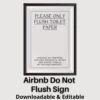Introduction
Airbnb hosting can be an exciting and rewarding venture, offering the opportunity to earn extra income while sharing your space with travelers from around the world. However, before you jump in, it’s important to understand that hosting comes with responsibilities, challenges, and the need for thoughtful preparation.
Whether you’re looking to rent out a spare room or manage a full-fledged vacation rental property, setting yourself up for success requires knowing key aspects of the business. This guide will walk you through the six most essential things to consider before becoming an Airbnb host, helping you navigate local regulations, financial planning, guest management, and more. By the end, you’ll be ready to make informed decisions and create a positive hosting experience for both yourself and your guests.
1. Understand Local Regulations and Laws
Before diving into Airbnb hosting, it’s crucial to familiarize yourself with the legal and regulatory framework that applies to short-term rentals in your area. Operating without understanding these requirements can lead to fines, penalties, or even the suspension of your listing. Here are the key aspects to consider:
Research Local Laws
- Zoning and Permits: Many cities have zoning laws that dictate where short-term rentals are allowed. Some areas require hosts to obtain specific permits or licenses to operate legally. Check with your local government or city planning office for detailed information.
- Short-Term Rental Caps: Some locations impose restrictions on the number of nights a property can be rented out annually. Understanding these caps is essential to avoid breaching local laws.
- Neighborhood Regulations: If your property is part of a homeowner’s association (HOA) or condominium, ensure that short-term rentals are permitted and comply with their specific rules.
Tax Obligations
- Local and State Taxes: In many regions, hosts are required to collect and remit occupancy taxes, also known as transient lodging or tourism taxes. Platforms like Airbnb often assist with tax collection, but you should verify if additional filings are needed on your end.
- Income Taxes: Income earned through Airbnb is taxable and must be reported. Familiarize yourself with how to declare rental income, deduct expenses, and comply with tax laws in your country.
Insurance Coverage
- Airbnb’s Host Guarantee: While Airbnb provides some coverage through its Host Guarantee and Host Protection Insurance, these may not cover all damages or liabilities. Review the specifics of Airbnb’s policy to understand its limitations.
- Additional Insurance: Consider purchasing short-term rental insurance to protect against gaps in Airbnb’s coverage. This type of insurance can provide added protection for damages, liability, and loss of income during repairs.
Why This Matters
Adhering to local laws and regulations not only keeps you compliant but also builds trust with neighbors and guests. Legal preparation ensures that you can focus on providing an excellent hosting experience without worrying about legal repercussions.
By understanding and adhering to these regulations, you lay the groundwork for a successful and hassle-free Airbnb hosting journey. Proper preparation in this area will save you from potential headaches and unexpected surprises down the road.
2. Financial Planning and Pricing Strategy
Before starting your journey as an Airbnb host, understanding the financial aspects is crucial. Proper financial planning helps you avoid unexpected expenses and ensures your hosting business remains profitable. Here are key considerations for setting up a strong foundation:
Start-Up Costs
- Furnishing and Decor: Invest in comfortable furniture, aesthetically pleasing decor, and essential appliances to make your property attractive to guests.
- Professional Photography: Quality photos are proven to increase bookings and justify higher prices. Consider hiring a professional photographer to showcase your space.
- Initial Supplies: Stock up on guest essentials like toiletries, linens, and kitchenware to provide a welcoming experience.
- Cleaning Services: Budget for professional cleaning services, especially if you plan to host frequently or are managing multiple properties.
Set Competitive Pricing
- Market Research: Analyze similar listings in your area to understand the pricing trends for comparable properties. Check their amenities, reviews, and availability to gauge demand.
- Dynamic Pricing Tools: Use Airbnb’s Smart Pricing or third-party tools like Beyond Pricing or Wheelhouse to adjust your rates based on seasonality, local events, and market demand.
- Consider Additional Fees: Include cleaning fees or pet fees to cover specific costs, but ensure they are reasonable to avoid deterring potential guests.
Hidden Costs
- Airbnb Service Fees: Airbnb charges hosts a percentage of each booking (usually 3%) as a service fee. Factor this into your pricing to maintain profitability.
- Taxes and Permits: Research local occupancy taxes, income taxes, and permit fees required for short-term rentals in your area.
- Maintenance and Repairs: Regular maintenance costs can add up, especially if your property experiences frequent wear and tear from guests.
- Utilities and Amenities: Increased usage of utilities like electricity, water, and Wi-Fi should be accounted for when hosting.
By understanding and planning for these financial elements, you can confidently set up your Airbnb hosting business with realistic expectations and a clear path to profitability. Strategic pricing and thorough budgeting will ensure that your property remains competitive while maximizing your income potential.
3. Create a Guest-Ready Space
One of the most important aspects of Airbnb hosting is ensuring your property is fully prepared for guests. A guest-ready space not only makes a great first impression but also sets the tone for a positive experience, leading to better reviews and repeat bookings. Here’s how to make your property welcoming, comfortable, and safe for your guests:
Focus on Cleanliness and Comfort
- Deep Clean Your Property: Guests expect hotel-level cleanliness. Pay attention to all areas, including kitchens, bathrooms, and high-touch surfaces like door handles and light switches. Regular professional cleanings between stays can help maintain these standards.
- Provide High-Quality Amenities: Stock essentials like fresh linens, towels, toiletries, and basic kitchen supplies (e.g., coffee, tea, and condiments). Consider adding extras like a hairdryer, ironing board, or locally inspired snacks for an added touch of care.
- Ensure Comfortable Furniture: Invest in quality mattresses, seating, and bedding to ensure your guests have a restful stay. Thoughtful details like extra pillows, blankets, and blackout curtains can further enhance their comfort.
Safety Features
- Install Safety Equipment: Equip your property with smoke detectors, carbon monoxide alarms, a fire extinguisher, and a first-aid kit. Regularly check these items to ensure they’re in working order.
- Secure Entryways: Provide sturdy locks, keyless entry options, or smart locks to give guests peace of mind. A clearly lit entrance with instructions for easy access is also essential.
- Comply with Local Regulations: If hosting regulations in your area require specific safety measures, such as emergency exit plans or childproofing, ensure these are implemented before hosting.
Add Personal Touches
- Welcome Package: Include a welcome letter, local recommendations, and small gifts like chocolates or a bottle of wine to make guests feel special.
- Thoughtful Decor: Create a warm and inviting atmosphere by adding personal touches to your space, such as framed artwork, local souvenirs, or potted plants.
- Provide Local Guides: Guests love personalized suggestions for nearby restaurants, attractions, and activities. Curate a list that showcases the best your area has to offer.
Test the Space Yourself
Walk through your property as if you were a guest. Test the appliances, check for any maintenance issues, and ensure everything is in working order. This exercise can help you identify and address potential issues before your first booking.
A guest-ready space is the foundation of a successful Airbnb hosting experience. By prioritizing cleanliness, comfort, safety, and thoughtful details, you’ll create a space that guests will love—and that will earn you glowing reviews.

4. Develop Excellent Guest Communication
Effective communication is the backbone of a successful Airbnb hosting experience. As a host, your ability to communicate clearly, promptly, and professionally with your guests can significantly impact their overall experience and the likelihood of receiving positive reviews. Here’s how to master guest communication:
Respond Promptly
Guests value quick and clear responses to their inquiries. Whether it’s a question about your listing, a booking request, or a concern during their stay, aim to reply within an hour. Airbnb tracks response time, and faster replies not only improve guest satisfaction but also boost your search ranking on the platform.
Pro Tip: Set up automated responses to acknowledge messages when you’re unavailable, and follow up with personalized replies as soon as you can.
Set Clear Expectations
Transparency is key to avoiding misunderstandings. Provide detailed and accurate information about your property, including:
- House rules (e.g., noise restrictions, pet policies).
- Check-in and check-out procedures.
- Information about amenities, parking, and nearby attractions.
A well-drafted welcome message or guidebook can help guests feel confident and prepared for their stay.
Be Proactive with Information
Anticipate guest needs by sharing essential details ahead of time. For instance:
- Send a message a few days before arrival with check-in instructions and local tips.
- Provide clear directions to the property and include photos if necessary.
Proactively offering information can reduce confusion and ensure a smoother experience for your guests.
Handle Feedback Gracefully
Not every stay will be perfect, but how you handle guest feedback matters. If a guest has a concern, listen attentively and address the issue promptly. For negative reviews, respond professionally and focus on resolving the problem. Guests appreciate hosts who take feedback seriously and make an effort to improve.
Build a Personal Connection
While it’s essential to remain professional, adding a personal touch to your communication can make guests feel more welcome. Use their names in messages, tailor recommendations based on their preferences, and wish them a pleasant trip.
Example: “Hi [Guest Name], I hope you’re excited about your stay! Let me know if you’d like recommendations for local restaurants or activities.”
Follow Up After the Stay
After check-out, send a thank-you message expressing gratitude for their visit. Politely encourage guests to leave a review if they enjoyed their stay. Positive reviews help build trust with future guests and improve your listing’s ranking.
Sample Follow-Up Message: “Thank you for staying with us, [Guest Name]! We hope you had a wonderful time. If you enjoyed your stay, we’d greatly appreciate it if you could leave us a review—it helps us improve and assist future guests!”
By mastering guest communication, you can create a seamless and enjoyable experience for your guests, fostering positive relationships and building a strong reputation as an Airbnb host. Effective communication not only enhances guest satisfaction but also sets the stage for glowing reviews and repeat bookings.
5. Prepare for Operational Challenges
Airbnb hosting is rewarding, but it also comes with its fair share of operational challenges. Being prepared to handle these effectively can save you time, reduce stress, and enhance your guests’ experience. Here’s what you need to know:
Time Commitment
- Hosting on Airbnb requires consistent time and effort. Tasks like cleaning, restocking supplies, communicating with guests, and updating your listing are part of daily operations.
- Tip: Use a checklist to streamline these tasks and ensure no detail is overlooked. For example, plan for weekly deep cleaning and schedule time for responding to inquiries.
Emergency Preparedness
- Unexpected situations, such as last-minute cancellations, property damages, or guest emergencies, can arise.
- Tip: Always have a contingency plan. For instance:
- Maintain a list of trusted handypersons or cleaners you can call at short notice.
- Keep an emergency fund for urgent repairs or refunds.
- Have clear policies outlined for cancellations or damages to avoid disputes.
Handling Negative Guest Experiences
- Not all guests will have a perfect stay, and some may leave unfavorable feedback.
- Tip: Address issues proactively. For example:
- Respond to guest concerns during their stay and try to resolve problems quickly.
- After a negative review, reply professionally, explaining steps you’ve taken to improve. This shows future guests that you value feedback.
Outsourcing and Automation
- If managing the property becomes overwhelming, consider outsourcing certain tasks.
- Property Management Services: Professional managers can handle everything from guest communication to cleaning and maintenance.
- Automated Tools: Use tools like automated messaging systems to send check-in instructions or follow-up reviews.
Balancing Workload
- If you manage multiple properties or have other commitments, balance is key to avoiding burnout.
- Tip: Delegate tasks when necessary. For example:
- Hire a co-host to assist with guest interactions.
- Use smart home devices like keyless entry systems to simplify check-ins.
By planning for these operational challenges and having systems in place, you’ll be better equipped to manage the demands of hosting on Airbnb. This not only makes the hosting process smoother but also ensures a better experience for your guests, leading to positive reviews and repeat bookings.
6. Focus on Building Positive Reviews
Reviews are the lifeblood of your success as an Airbnb host. Positive reviews not only boost your listing’s visibility in search results but also build trust with potential guests, making them more likely to choose your property. Here’s how to consistently earn glowing reviews:
Deliver Exceptional Service
- Exceed Guest Expectations: Go beyond the basics to create a memorable experience. Small gestures like providing a welcome basket, local recommendations, or extra amenities can leave a lasting impression.
- Attention to Detail: Ensure the property is spotless, well-stocked with essentials, and accurately represented in your listing. Guests value a property that matches or exceeds their expectations.
Be Proactive and Responsive
- Prompt Communication: Respond to guest inquiries and messages quickly and politely. Effective communication makes guests feel valued and reduces any anxieties they might have about their stay.
- Anticipate Guest Needs: Think ahead about what your guests might need, such as extra blankets, toiletries, or detailed instructions for appliances, and provide these in advance.
Encourage Reviews
- Polite Reminders: After the stay, send a friendly message thanking guests for their visit and encouraging them to leave a review if they enjoyed their experience. For example: “It was a pleasure hosting you! If you enjoyed your stay, we’d greatly appreciate a review. Your feedback helps us improve and helps future guests.”
- Leave a Review First: Writing a thoughtful review for your guests can prompt them to reciprocate, as Airbnb notifies both parties when a review is left.
Leverage Constructive Feedback
- Learn from Reviews: Take guest feedback seriously, especially if it highlights recurring issues. Use this as an opportunity to improve your hosting practices or fix problems with the property.
- Respond to Negative Reviews Gracefully: Acknowledge any legitimate concerns raised in negative reviews, apologize where necessary, and explain what you’ve done to address the issue. This shows future guests that you’re committed to providing excellent service.
Highlight Positive Reviews in Your Listing
- Showcase excerpts from glowing reviews in your listing description to build credibility and appeal to potential guests. Phrases like “Guests love our spacious layout and thoughtful amenities” can be effective.
By prioritizing guest satisfaction and actively managing your reviews, you’ll build a strong reputation as a host, attract more bookings, and set yourself apart from the competition. Positive reviews are a direct reflection of your commitment to excellence and are essential for long-term success as an Airbnb host.
Conclusion
Becoming an Airbnb host can be a rewarding and profitable venture, but success requires preparation and attention to detail. By understanding local regulations, planning your finances, creating a welcoming space, mastering guest communication, preparing for challenges, and focusing on earning positive reviews, you’ll set a solid foundation for your hosting journey.
Each of these six tips is a stepping stone to creating a memorable and seamless experience for your guests while building your reputation as a reliable and successful host. Hosting on Airbnb is not just about renting a space—it’s about creating connections, delivering hospitality, and meeting new opportunities.
Take the time to implement these strategies, and you’ll be well on your way to enjoying the benefits of Airbnb hosting with confidence and success.








